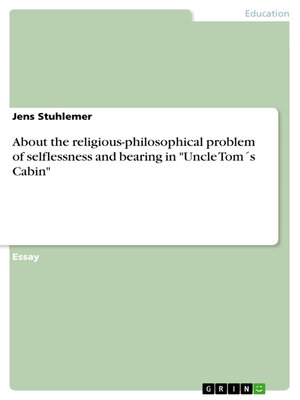About the religious-philosophical problem of selflessness and bearing in "Uncle Tom´s Cabin"
ebook
By Jens Stuhlemer

Sign up to save your library
With an OverDrive account, you can save your favorite libraries for at-a-glance information about availability. Find out more about OverDrive accounts.
Find this title in Libby, the library reading app by OverDrive.



Search for a digital library with this title
Title found at these libraries:
| Library Name | Distance |
|---|---|
| Loading... |
Essay from the year 2012 in the subject Didactics for the subject English - Literature, Works, grade: 1.0, University of Cologne, language: English, abstract: Reaching for Christianity is one, maybe the most central theme in "Uncle Tom´s Cabin". Stowe uses her view on religion as her main instrument to abolish slavery. The textual construction of Christian values throws up questions about their persuasiveness to a modern reader. To find answers to such questions it is necessary to itemize Stowe´s schema in order to question them from a modern point of view. Harriet Beecher Stowe originates from a strongly Christian affected background. Her father, brother, and husband were all theologians. Stowe liked to say God inspired her to write "Uncle Tom´s Cabin" and that he even dictated her. It also must be mentioned, that most of her female readership also had a Christian background. This was not only based on the long American tradition of Christianity, but also on the idea of being the chosen country, pronounced in the Manifest Destiny. A whole country built itself upon the idea of a self given authority, which the white America saw as God given. This supported the common understanding of a new American race, which white America saw superior to the Afro-American population. White America not only thought of itself as more knowledgeable, but also as dominant rulers in the name of Christianity. But how is this evident in "Uncle Tom´s Cabin"? Which religious aspects need to be reviewed and which deserve critic?






